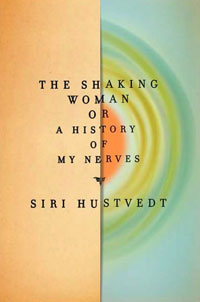Like Your Back Ain't Got No Bone

Though I am certain a regular diet from the overflowing stream of brain science would result in unconscious mimicry of various symptoms, I have continued to find neurologist Oliver Sacks’s (Musicophilia) case studies of neurological deficits and aberrations provocative and enlightening. As I did British literary consigliere Robert McCrum’sMy Year Off: Recovering Life After a Stroke, as the title indicates, an enthralling view of an “insult to the brain” from the inside. Now comes Siri Hustvedt’s reckoning of her own neurological travail in The Shaking Woman or A History of My Nerves (Henry Holt).
Hustvedt’s (The Sorrows Of An American) problems began in 2006 when she suffered a peculiar kind of seizure at a memorial event for her father—she began flapping her arms and shaking her legs, but she was able to speak clearly. The mysterious seizures continued and thus Hustvedt was compelled to cast about for a diagnosis. Questioning the usual of array of experts, she also stumbled upon the young but growing discipline of neuropsychoanalysis, which extends the reach of the perennial mind-body relationship.
Hustvedt ruminates:
Neurological and psychiatric illnesses are different, however, because they often attack the very source of what one imagines is one’s self. “He’s an epileptic” doesn’t sound strange to us. In the psychiatric clinic, the patients often say, “Well, you see, I’m bipolar” or “I’m schizophrenic.” The illness and the self are fully identified in these sentences. The shaking woman felt like me and not like me at the same time. From the chin up, I was my familiar self. From the neck down, I was a shuddering stranger. What ever had happened to me, what ever name would be assigned to my affliction?
Illuminating the core question of her history, Siri Hustvedt, a fearless investigator and lucid storyteller, creates a mesmerizing picture. As Oliver Sacks relates:
The Shaking Woman
